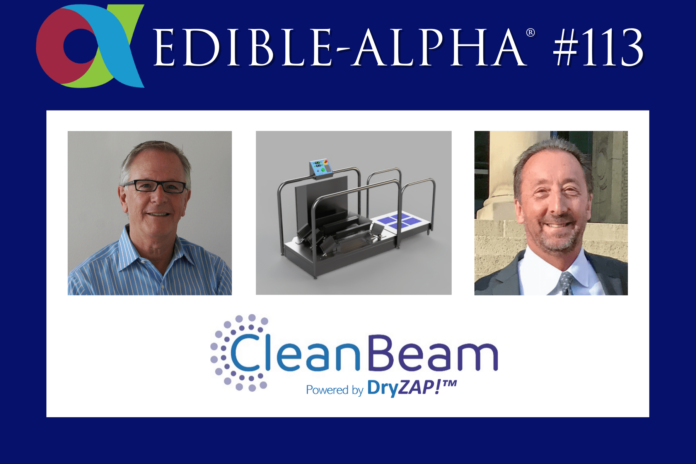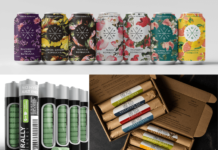
Subscribe: Apple Podcasts | Google Podcasts | Spotify | Email | TuneIn | RSS | More
In Edible-Alpha® podcast #113, Brad connects with Mark Cottone, founder of Clean Beam, and Jim Rush, the company’s marketing director. Clean Beam’s revolutionary footwear sanitizer powered by DryZap!, its patented pulsed ultraviolet (PUV) light technology, helps processing facilities enhance food safety and security.
After Mark’s other company, Cougar Packaging Concepts, began using PUV to sanitize and extend the shelf life of food, the idea arose to apply DryZap! to footwear in food processing facilities. He started Clean Beam about five years ago to develop a dry, fast, chemical-free sanitation solution to replace boot washers and other existing systems, which are notoriously problematic.
The initial goal was simply to protect plant employees from slipping. But then, through rigorous testing, the team realized DryZap’s superior speed, efficacy, and consistency in eliminating a wide range of contaminants. PUV kills bacteria, molds, yeasts, and other pathogens in six seconds or less and delivers the kill value of heat without changing a product’s temperature.
Plus, as an electronic system, the Clean Beam sanitizer tracks every user and feeds data into the cloud. This enables plants to track movement patterns and pinpoint the source of problems should they occur. Overall, DryZap! has the potential to prevent security breaches while providing total traceability, monitoring, and predictive analytics.
Clean Beam’s innovation is especially timely, as all food manufacturers must now comply with Food Safety Modernization Act (FSMA) rules. Through FSMA, FDA requires companies to implement preventative controls, to be proactive about food safety rather than reactive.
Although DryZap! would be a stellar solution for most any production facility, there is still a steep education curve for many food companies. In their industry conversations, Mark and Jim explain that FSMA compliance is about more than checking a box. Yes, a standard boot washer might make them compliant, and no, they may not foresee any safety issues now, but the costs of weathering a recall are astronomical. As Jim points out, “this is a cost-avoidance play as much as a cost-savings play.”
Along with educating potential customers, Clean Beam also listens to their pain points and needs. This consultative selling approach may be slower than hard-selling, but Brad says it is ultimately more effective. It helps entrepreneurs engender trust in the industry and hone their solutions to better suit the companies they want to help. This has definitely been the case for Clean Beam, which has been evolving its offerings in response to these conversations—and they are definitely not done innovating yet!
Tune in to hear the full story of Clean Beam’s inception, development, launch, sales strategy, and goals for growth. This podcast offers great guidance and inspiration for food technology entrepreneurs, as well as food manufacturers looking to safeguard their operations.


